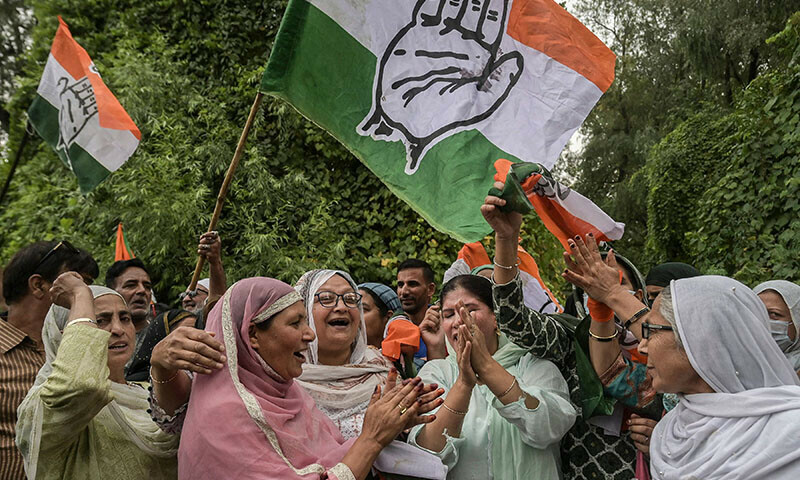
[ad_1]

Indian Occupied Kashmir (IOK) elected on Tuesday its first government since the restive Himalayan territory was brought under New Delhi’s direct control, as voters backed opposition parties to lead its regional assembly.
Hindu nationalist Prime Minister Narendra Modi’s government cancelled Kashmir’s partial autonomy to control its affairs in 2019, a sudden decision accompanied by mass arrests and a months-long communications blackout.
Since then, the Muslim-majority territory of some 12 million people has not had an elected local government. Instead, it has been ruled by a governor appointed by New Delhi.
While voters took part in national elections in June when Modi won a third term in power, these were the first local elections since 2014.
As results were announced, with an alliance of the opposition National Conference (NC) and Congress parties tipped to form a government, supporters celebrated.
By mid-afternoon, Election Commission figures showed NC and Congress had won 47 of 90 seats in the assembly, an unassailable lead over Modi’s Bharatiya Janata Party (BJP), with 27.
Some called the vote a de facto referendum on the federal government’s decision to repeal the territory’s special status.
“The people have given their judgement against what New Delhi did,” social activist Iqbal Ahmad Bhat said.
Half a million Indian troops are deployed in the far northern region, battling a 35-year insurgency in which tens of thousands of civilians, soldiers and rebels have been killed, including dozens this year.
‘Political rights’
“We are happy with the election results, and hope that the political rights will be restored,” said Jahangir Ahmad, among the cheering crowds outside the home of the territory’s expected new chief minister, NC leader Omar Abdullah.
Farooq Abdullah, his father and NC president, told reporters that the results were a “verdict” against Modi’s government.
Critics however say the assembly will only have nominal powers over education and culture.
New Delhi will also have the power to override legislation, and will continue to appoint the governor.
Modi’s BJP says the changes to the territory’s governance have delivered a new era of peace to IOK and rapid economic growth — claims other parties reject.
The BJP won seats in the southern Hindu-majority Jammu region, and fought only from about a third of the seats in the Kashmir valley.
Meanwhile, results from elections in Haryana — a state just north of New Delhi — were also released on Tuesday.
In those polls, Modi’s BJP was leading the opposition Congress.
Among the newly-elected state legislators was the recently retired star wrestler Vinesh Phogat, standing for Congress.
The 30-year-old World bronze medallist switched to politics after being disqualified from the women’s 50kg competition at the Paris Olympics for being overweight ahead of the final.
Last year she took part in protests against the then-national wrestling federation chief who faced accusations of sexual harassment.
BJP had moved into the lead in elections in the northern state of Haryana, reversing early trends when it was trailing the main opposition Congress party, TV channels reported.
Elections in Haryana and the troubled Himalayan territory of occupied Jammu and Kashmir were held in phases that ended on Saturday, the first test of popularity since Narendra Modi returned as prime minister for a record third, straight.
Exit polls had predicted a win for the main opposition Congress party in Haryana and gave an edge to Congress and its regional ally National Conference (NC) in the region.
Both legislatures have 90 seats each.
The counting showed BJP was leading in 51 seats in Haryana, where it has held power for a decade, while Congress was ahead in 33 seats, TV channel CNN-News18 reported.
In occupied Jammu and Kashmir, which held its first provincial poll in a decade and the first since it was split into two federally administered territories in 2019, the Congress-NC alliance was ahead in 49 seats while BJP was leading in 27.
A win in Haryana would be a boost for BJP after it failed to secure an outright majority in national elections, and as it approaches provincial elections in the more politically significant states of Maharashtra and Jharkhand.
The industrial hub of Maharashtra is presently ruled by a BJP coalition, and an opposition alliance is in power in mineral-rich Jharkhand.
Elections in both states, although yet to be announced, are expected to be held in November.
Victory for Congress in occupied Jammu and Kashmir will come as a major boost for its leader, Rahul Gandhi, the scion of a dynasty that gave India three prime ministers but who was blamed for the party’s slump since Modi swept to power in 2014.
Gandhi was also the face of the two-dozen-party opposition alliance that denied Modi an outright majority in the parliamentary election and is currently the leader of the opposition in the lower house of parliament.
[ad_2]
Source link






